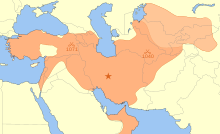
Back أرسلان شاه (سلاجقة العراق) Arabic ارسلان شاه ARZ Arslanşah (İraq Səlcuq hökmdarı) Azerbaijani ارسلانشاه یکم Persian ارسلانشاه MZN Arslanşah (Irak Selçuklu meliki) Turkish Арслан-шах (султан Іраку) Ukrainian Arslan Shah ZH-MIN-NAN
| Arslan Shah Rukn al-Din | |
|---|---|
| Abu al-Muzaffar | |
 The Seljuk state at its greatest extent in 1092, after the death of Sultan Jalal al-Dawla Malik Shah | |
| Sultan of Seljuk Empire | |
| Reign | 1160–1176 |
| Predecessor | Suleiman-Shah |
| Successor | Toghrul III |
| Born | 1133 |
| Died | 1176 (aged 42–43) |
| Spouse | Kerman Khatun Mahd Rafi Khatun Sitti Fatima |
| Issue | Toghrul III |
| Father | Tughril II |
| Mother | Mumina Khatun |
| Religion | Sunni Islam |
Rukn al-Din Abu al-Muzaffar Arslan Shah Ibn Tughril II (1133–1176) was a Seljuk sultan who appointed as ruler of Iraq and Persia. His reign lasted fifteen years and seven months. His reign was distinguished by the influence and dominance of the prince and founder of the Atabeg of Azerbaijan, “Shams al-Din Eldiguz,” after the death of Arslan's father. Shah, his mother, Momina Hatun, married Eldiguz, and his uncle, Sultan Masoud, took care of him.[1] In 1160, Shams al-Din declared Arslan Shah installed as ruler of the Seljuk Sultanate in Iraq.
Eldiguz participated in the princes of the Seljuk state in their struggle to reach the position of the Sultanate more than once, and he supported one party over the other, and his contribution to these struggles had a great impact on the arrival of his stepson, Arslan bin Tughrul bin Muhammad, to the position of Seljuk Sultan in Persia and Iraq. So Arslan kept Atabeg Eldiguz in Hamadan (the capital of Seljuk Iraq) and appointed his maternal brother, Muhammad Jahan Bahlawan bin Eldiguz, as his chamberlain. Eldiguz's influence remained strong until his death in 1172 (568 AH), and Sultan Arslan had nothing but his name to be addressed on the pulpits and his name would be struck.
Important political decisions were made by Prince Eldiguz and Arslan Shah was practically under the monarchy. However, Arslan Shah, with the help of Amir Eldiguz, managed to avoid the events and developments that occurred during his reign, including the Georgian invasion plots of Muslim lands and the Georgian seizure of Azerbaijan, the struggle against the Ismailis and the occupation of their fortresses. Which led to the relative stability of the foundations of the Seljuk government during the reign of Arslan Shah.